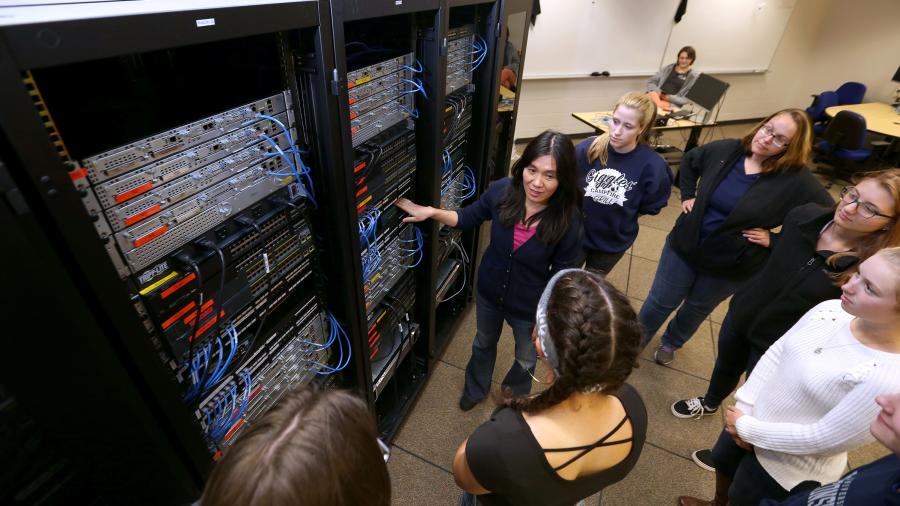Cybersecurity has become an issue of personal, national and international concern, with internet attacks harming individuals, businesses, government institutions and drawing scrutiny in U.S. elections.
Americans lost $6.9 billion in cyber crime in 2021, according to the FBI.
Graduates from a new program at University of Wisconsin-Stout will be ready to help. A Bachelor of Science program in cybersecurity approved April 7 by the UW System Board of Regents will train graduates to help meet high demand for professionals in the field.
Students can take the program on campus or online beginning in fall 2022. Enrollment is open.

“This program will allow UW-Stout to continue providing leadership and innovation to produce qualified cybersecurity professionals and meet both current and future business and government needs,” said Glendali Rodriguez, provost and vice chancellor for Academic Affairs.
The program will complement well-established computer and information technologies programs at UW-Stout that already have components of cybersecurity, meaning the instructors, curriculum and facilities infrastructure already exist to offer the program. About 280 students are enrolled in the related programs.
UW-Stout also offers a minor, two certificates and two concentrations related to cybersecurity.
In addition, UW-Stout has a Cybersecurity Research and Outreach Center, which was established in 2017 when the university was designated a National Center of Academic Excellence in Cyber Defense by the National Security Agency and Department of Homeland Security. UW-Stout was the first four-year institution in Wisconsin to receive the designation.
As a result, UW-Stout students are:
- Prepared to take cybersecurity certifications and Department of Defense mandated certifications
- Eligible for the Department of Defense Cyber Scholarship Program.
Demand, starting salary high
Demand for cybersecurity professionals is high, with the global workforce in the field short about 1.8 million workers. Between 2020 and 2025 the need is expected to grow by nearly 7%, including high demand for workers in Wisconsin, Minnesota, Illinois and Michigan.
The average pay for entry level cybersecurity analyst positions in Wisconsin is $70,000.

An advisory council of cybersecurity professionals gathered by UW-Stout affirmed a need for more professionals with bachelor’s degrees.
Enrollment for the on-campus program is projected to be 15 and rise to 150 within four years, with similar numbers for the online program.
“Our B.S. cybersecurity program with hands-on training in a real-world cybersecurity laboratory setting will broaden students’ subject matter knowledge and skills needed for the growing cybersecurity job market,” Rodriguez said, citing a required co-op and capstone course, part of UW-Stout’s experiential learning focus.
The 120-credit program will include 69 credits in core cybersecurity, 40 in general education and 11 in electives. Graduates will be able to:
- Analyze a complex computing problem and apply principles of computing and other relevant disciplines to identify solutions
- Apply security principles and practices to the environment, hardware, software and human aspects of a system
- Analyze and evaluate systems with respect to maintaining operations in the presence of risks and threats
- Communicate effectively in a variety of professional contexts
- Recognize professional responsibilities and make informed judgments in computing practice based on legal and ethical principles
Along with numerous lab-based courses, the program will collaborate with industry partners and involve research opportunities in cloud computing, 5G, health care and the industrial internet of things.
Program outreach will include technical colleges and K-12 schools to broaden participation in cybersecurity, including women, veterans and first-generation and low-income students.
UW-Stout works closely with technical colleges to help students transfer credits and earn a bachelor’s degree.
Goals of UW-Stout’s FOCUS2030 strategic plan include student success and a universitywide focus on equity, diversity and inclusion.
UW-Stout also received approval recently for a new major in individualized studies, targeting adult, transfer and re-entry students.
###







